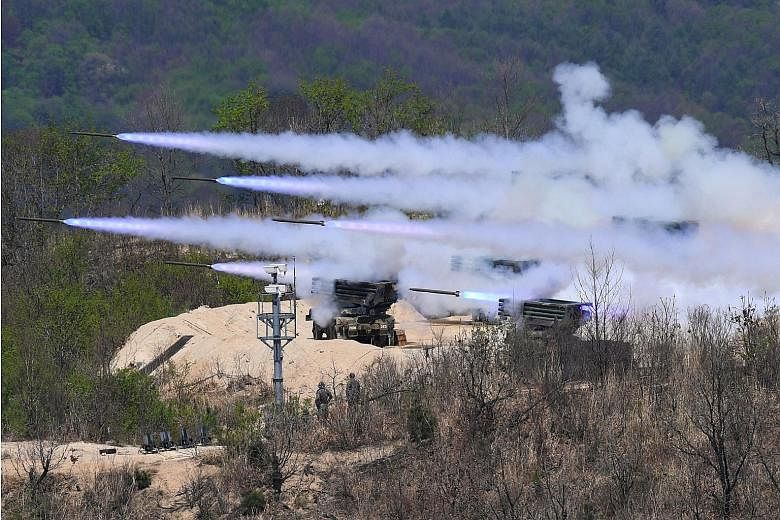WASHINGTON •The Trump administration has come under growing pressure to open negotiations on a temporary freeze on North Korea's nuclear and missile tests in return for reducing the US military footprint in the Korean peninsula, according to American officials and foreign diplomats.
Versions of the proposal, floated by Beijing for several months, have been revived several times this week - first by South Korea's newly installed President, and then by China's Foreign Minister and one of its top military officials in talks on Wednesday with US Secretary of State Rex Tillerson and Defence Secretary James Mattis.
But White House officials say they are not interested in any proposal that would require the United States to lift military or economic pressure on the North, even in return for a moratorium on tests.
Instead, Mr Tillerson and Mr Mattis publicly pressed the Chinese to exert more diplomatic and economic pressure on Pyongyang, though President Donald Trump indicated on Twitter on Tuesday that he had just about given up on obtaining help from the Chinese.
"China understands that the United States regards North Korea as our top security threat," Mr Tillerson told reporters at a news conference after meetings with China's State Councillor Yang Jiechi and People's Liberation Army Chief of Joint Staff Fang Fenghui.
It was the first security dialogue with Beijing conducted by the Trump administration.
"We reiterated to China that they have a diplomatic responsibility to exert much greater economic and diplomatic pressure on the regime if they want to prevent further escalation in the region," Mr Tillerson added.
Like his predecessors, Mr Trump is gradually learning that for all its talk about cooperation, China is deeply reluctant to take any measures that could seriously destabilise the North Korean government, for fear the country might collapse or be absorbed by the South.
So China's strategy has been to buy time - and preserve the status quo - with talks that may be linked to some kind of testing freeze. They may now have a new advocate of that approach, South Korean President Moon Jae In, who was elected on a platform pledging resumed engagement with the North.
On Tuesday, Mr Moon embraced a similar idea, telling CBS News host Norah O'Donnell in an interview that a freeze could be a way-station to a second phase of talks that would "achieve the complete dismantling of North Korea's nuclear programme".
In an interview broadcast on Wednesday, North Korean Ambassador to India Kye Chun Yong said his country was willing to consider a moratorium on nuclear and ballistic missile tests if the US and South Korea stopped their annual joint military exercises.
"Under certain circumstances, we are willing to talk in terms of freezing nuclear testing or missile testing," Mr Kye said, speaking in English. "For instance, if the American side completely stops big, large-scale military exercises temporarily or permanently, then we will also temporarily stop."
But to US officials, a freeze is a trap that previous administrations have stepped into.
The Clinton administration tried a freeze in 1994 that the North Koreans first cheated on and then openly discarded early in the administration of president George W. Bush. At the end of Mr Bush's term, a second such freeze and partial dismantlement of a nuclear reactor was negotiated, only to be abandoned by the North Koreans as soon as president Barack Obama entered office.
Meanwhile, North Korea yesterday called Mr Trump a "psychopath" as tensions soared following the death of American student Otto Warmbier, who was evacuated in a coma last week after detention in North Korea.
The official Rodong Sinmun newspaper said in an editorial that the US President was in a "tough situation" at home and claimed he was toying with the idea of a pre-emptive strike on North Korea to divert attention from a domestic political crisis.
NYTIMES, AGENCE FRANCE-PRESSE

